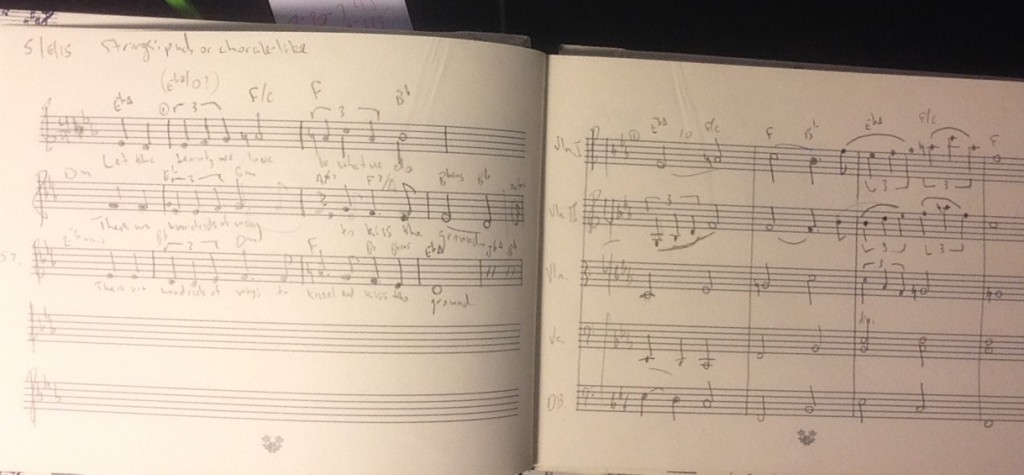
One more look back at 2015: In addition to all the projects I was lucky enough to work on for others throughout the year, I took advantage of down time between projects to focus on some of my own passions.
I read a lot of poetry these days, and for a couple years have wanted to find time to set a couple of my favorites to music. I decided to start with this one, by the 13th century Persian poet and Sufi mystic Rumi:
Today, like every other day, we wake up empty
and frightened. Don’t open the door to the study
and begin reading. Take down a musical instrument.Let the beauty we love be what we do.
There are hundreds of ways to kneel and kiss the ground.
I sketched out the orchestration as I was writing the melody, deciding pretty early on to use the Lydian mode (think of a major scale, but with a raised 4th, so the piece started in E-flat, which meant “A” was natural, and gave me the chance to use the tritone–E-flat to A–in almost every phrase). The instrumentation stayed the same from the first sketches: flute, English horn, bass clarinet, French horn, harp, and a full string section.
In June, for a Nashville Composer Collective concert, I conducted a 22-piece orchestra comprised of some of Nashville’s best musicians for the premier, with my friend Sarah Masen singing. The audio is up on Soundcloud, and an iPhone-recorded video on Youtube (the Soundcloud version was recorded with good mics set up above the orchestra).
~~~~~
I recently heard the term “combinatory play” for the first time. Albert Einstein came up with it to describe his creative process, and how his many interests helped his scientific work. Maria Popova, over at Brain Pickings, points out that “Einstein famously came up with some of his best scientific ideas during his violin breaks.” While working on setting the Rumi poem I was also ruminating over ideas for an essay about cynicism, and I found that focusing on writing the essay for a couple hours meant that my brain came up with new ideas and colors to try in the musical composition.
I’m thankful to the folks over at Art House America for publishing the piece that came out of those hours of scribbling, An Antidote for Cynicism. Here’s an excerpt (click the title to read the full essay).
In her poem “Possibilities,” Nobel prize winner Wisława Szymborska declares: “I prefer myself liking people / to myself loving humanity.” I like that better than what I learned growing up. I find it much more hopeful. My childish conceptions of others and how I was expected to treat them fell apart as I grew older and met people outside of the small world I grew up in. These were people I genuinely liked and wanted to be around, people I even hoped to be like as I grew older, and the boxes I had been taught to put them in no longer fit.
I’m reminded of a passage from Reinhold Niebuhr’s Leaves from the Notebook of a Tamed Cynic (the book I name whenever I find myself in conversations about favorite titles). He wrote this in a 1926 journal entry from Detroit where he served as a pastor for thirteen years before joining the faculty of Union Seminary in New York City. Writing amid the upheaval and mistreatment of workers that accompanied Henry Ford and his assembly lines, he had ample opportunity to become ever more jaded and cynical, joining his fellow Detroit ministers in abstract declarations of their love — and God’s love — for the masses while keeping their distance from the people. Instead, he dug in. He chose intimate knowledge over abstraction:
“Cynics sometimes insinuate that you can love people only if you don’t know them too well; that a too intimate contact with the foibles and idiosyncrasies of men will tempt one to be a misanthrope. I have not found it so. I save myself from cynicism by knowing individuals, and knowing them intimately.”…When I was a child, I lived in fear. Now that I’m a man, I’m learning — slowly, it sometimes seems — how to act out of love; love for my friend, love for my neighbor, love for myself. Love grounded in particulars, freed from the burden of empty rhetoric. Love that honors the dignity and complexity of every person I meet.